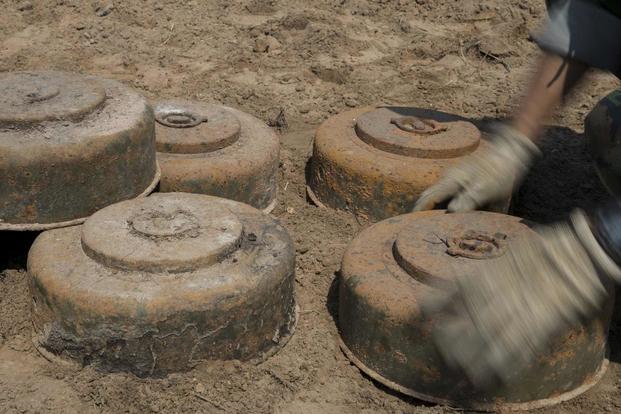The Trump administration has reversed an Obama-era policy that largely prohibited military use of anti-personnel land mines.
In a statement Friday, the White House said that President Donald Trump's decision to rescind the 2014 guideline was based on the "commitment to ensuring our forces are able to defend against any and all threats."
"The Department of Defense has determined that restrictions imposed on American forces by the Obama Administration's policy could place them at a severe disadvantage during a conflict against our adversaries," the statement said. "The President is unwilling to accept this risk to our troops."
As a result, the Pentagon will issue a new land mine policy, which will give commanders, at their discretion and in exceptional circumstances, the ability "to employ advanced, non-persistent land mines specifically designed to reduce unintended harm to civilians and partner forces," the White House said.
Related: US Plans to Relax Restrictions on Land Mines
The change was first reported this week by CNN and Vox, citing both State Department cables and U.S. officials.
When asked about it ahead of the announcement, Defense Secretary Mark Esper did not deny the media reports. "There will be a change coming out. I'm not going to comment on it until it is," he said during a press briefing Thursday.
The 2014 policy largely complied with the 1997 Ottawa Treaty, an agreement signed by more than 160 countries prohibiting the use, stockpiling, production and transfer of anti-personnel mines. However, the U.S. opted to continue their use on the Korean Peninsula, where roughly 28,000 American service members are stationed.
According to CNN, which cited Pentagon officials, the White House's decision was prompted by a 2017 review launched by then-Defense Secretary Jim Mattis that found the ban posed an "increased risk to mission success" and, in turn, increased potential of U.S. troop casualties.
The change will permit the use of land mines retrofitted with devices that allow the weapons to automatically self-destruct or deactivate after 30 days, CNN said.
"This action is yet another in a series of actions taken by the Trump administration to give our military the flexibility and capability it needs to win," the White House said Friday. "President Trump is rebuilding our military, and it is stronger than ever."
Similarly, in 2017, the Pentagon reversed its plan to ban cluster munitions and kept its stockpiles, citing threats from North Korea as the reason to keep the munitions.
Then-Deputy Defense Secretary Patrick Shanahan signed a directive that December to stop a 2008 policy approved by former Defense Secretary Robert Gates, which had stipulated the Pentagon would "no longer use cluster munitions which, after arming, result in more than one percent unexploded ordnance" by the end of 2018.
Shanahan said that developing a replacement for cluster bombs would take too long when faced with the North Korean threat, so the Pentagon looked to available capability.
-- Oriana Pawlyk can be reached at oriana.pawlyk@military.com. Follow her on Twitter at @Oriana0214.
Read more: Air Force Finally Releases New Images of Stealthy B-21 Future Bomber












